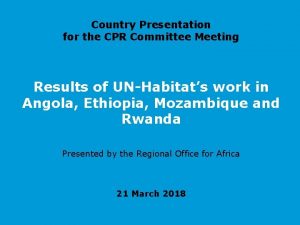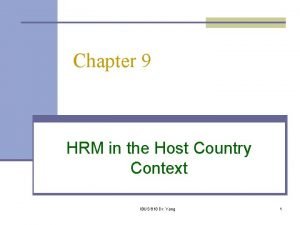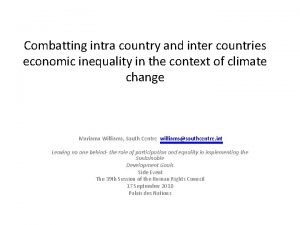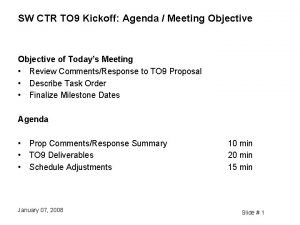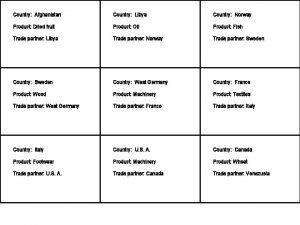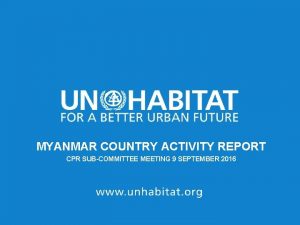Country Presentation for the CPR Committee Meeting Results










- Slides: 10

Country Presentation for the CPR Committee Meeting Results of UN-Habitat’s work in Angola, Ethiopia, Mozambique and Rwanda Presented by the Regional Office for Africa 21 March 2018

Background • The Regional Office for Africa has the responsibility to coordinate UN-Habitat country activities with all HQ Thematic Branches and to supervise UN-Habitat country teams in sub. Saharan Africa. • UN-Habitat project development at the country level needs to be aligned with: - Globally: the UN-Habitat Strategic Plan, the New Urban Agenda and the Sustainable Development Goals (SDGs) - Nationally: the United Nations Development Assistance Framework/Programme (UNDAF/UNDAP), within the delivering as One UN context, and the national development priorities set by the government - Donors programmes and priorities in that given country.

Rationale • UN-Habitat presence at the country level fully depends on the existing/on-going project portfolio, hence successful fund raising is a precondition to country presence Challenge: importance of UN-Habitat presence at the country level vs. unpredictable funding structural fragility • Sustaining a country programme requires: ü High relevance & cutting-edge knowledge/expertise ü Flexibility to adapt to the local conditions ü Acquired trust through increased credibility, consistent delivery of results and long-lasting impact ü Establishment of strong partnerships with government, local authorities, UN Agencies, bi/multi-lateral donors, CSOs, academia and the private sector

Angola • Mo. U signed in 2011 resulted in a financial contribution in 2014 to support the development of a National Urban Policy (NUP) 2016 / 2017 • The UN-Habitat Country Programme approved at the President’s Office level. UN-Habitat is the only UN Agency in Angola being funded by the Government • Structuring country programme/policy leading to project development & UN Joint Programming 201 8

Ethiopia Objectives Support the Government of Ethiopia in implementing the urban component of GTP II in alignment with SDG 11 and the NUA Pillars Urban and Regional Planning Cross Cutting Advocacy - Awareness Raising - Participatory Approach Capacity Development - Technical Advice - Policy Support Urban Resilience Housing and Urban Basic Services Urban Monitoring and Research

Rwanda • Mo. U signed in Oct. 2017 to implement the UN-Habitat Country Programme • NUP linked to a Spatial Development Framework • City-wide informal settlements upgrading strategy for Kigali City • Rapid Planning project • Urban LEDS 2 • Smart City Master Plan • One Stop Youth Center • Housing construction for Rwandan Returnees

Mozambique • Demographic boom and a fast urbanising country (32% urban) • 60% of the population lives in areas vulnerable to floods, ciclones and drought • UN-Habitat present since 2002 – over 40 projects implemented and 30 M usd mobilised; currently country team ranges between 20 -25 staff • Diverse country programme: urban/ regional planning, slum upgrading & basic services, housing, DRR & climate resilience, policy & legislation, capacity building • Current priorities: National Urban Policy; resilient infrastructure; support the National Housing Policy

Main characteristics of the country programme and current priorities Main characteristics: • From advocacy to demonstration to policy • Resilient construction influencing the building codes • On-the-job capacity building at the different levels • Credible institution • Strong partnerships (Government, UN, NGOs, WB, bilaterals…) Current priorities: Ø Advocate and develop a National Urban Policy Ø Promote resilient infrastructure Ø Support the implementation of the National Housing Policy

Conclusions and recommendations (also based on the feedback from the CPR sub-Committee) • Work/presence of UN-Habitat at the country level is relevant to support the implementation of the New Urban Agenda locally • UN-Habitat unique and broad mandate for sustainable urbanisation, a process that interests all human settlements, is an effective tool for increasing our relevance in the field and mobilise resources • At the country level, there is a need to combine both policy/planning support with actual enforcement/ implementation, i. e. combining both normative and operational work as a two-ways relationship • There is a need to look at how to improve rules and regulations to confer more sustainability to UN-Habitat’s country presence and ensure more efficient delivery of results

10
 Cpr committee
Cpr committee Host country and home country
Host country and home country Intra country vs inter country
Intra country vs inter country Boy scout troop committee organization chart
Boy scout troop committee organization chart Steering committee meeting agenda sample
Steering committee meeting agenda sample Pa safety committee certification
Pa safety committee certification Tcm technical committee meeting
Tcm technical committee meeting For today's meeting
For today's meeting Meeting objective
Meeting objective What is meeting and types of meeting
What is meeting and types of meeting Types of meeting
Types of meeting
